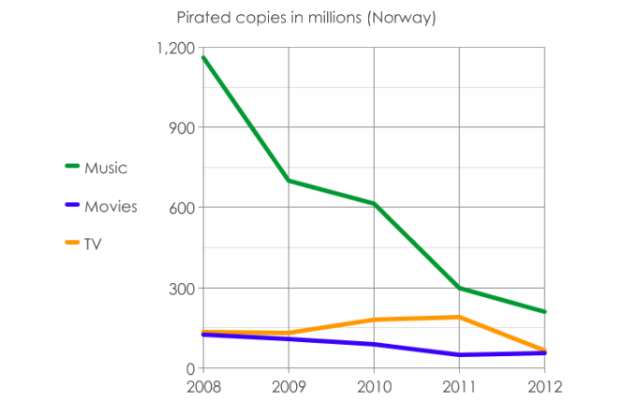
We often hear about the ridiculous silly measures companies like HBO implement to slow down piracy. Today, we learn that they might be working. According to a new report by a publication called Ipsos (via TorrentFreak), piracy is way down in Norway, and has been dropping dramatically since 2008. What’s the deal?
By 2012, pirated music, TV shows, and movies had dropped to a fraction of what it was in 2008. Music piracy has seen the biggest drop. An estimated 1.2 billion songs were copied without permission in 2008, but by 2012, that number dropped to 2010 million – an 82.5 percent drop. TV shows and movie piracy also fell by about half during the period.
There have been a number of anti-piracy campaigns in Norway, but are these actually responsible for the dip? We saw plenty of anti-piracy campaigning from 1999 – 2008, but piracy only continued to rise during the period. The difference this time might be the rise in legal options. Since 2008, a number of good piracy alternatives have become popular. Internet radio services like Pandora and Spotify are often easier to use than a torrent or shady streaming site. The popularity of video services like Hulu and Netflix has also risen since 2008.
“When you have a good legitimate offer, the people will use it,” said Olav Torvund, former law professor at the University of Oslo. “There is no excuse for illegal copying, but when you get an offer that does not cost too much and is easy to use, it is less interesting to download illegally.”
While worldwide piracy numbers remain unavailable, it would not surprise us if piracy is down all over the globe. When it becomes affordable, easy, and more convenient to use legal alternatives, people generally do (PDF). Perhaps HBO should take note. If it didn’t require both an HBO subscription and a $60-$100 cable TV subscription to get HBO Go, more people might do it the legal way.


